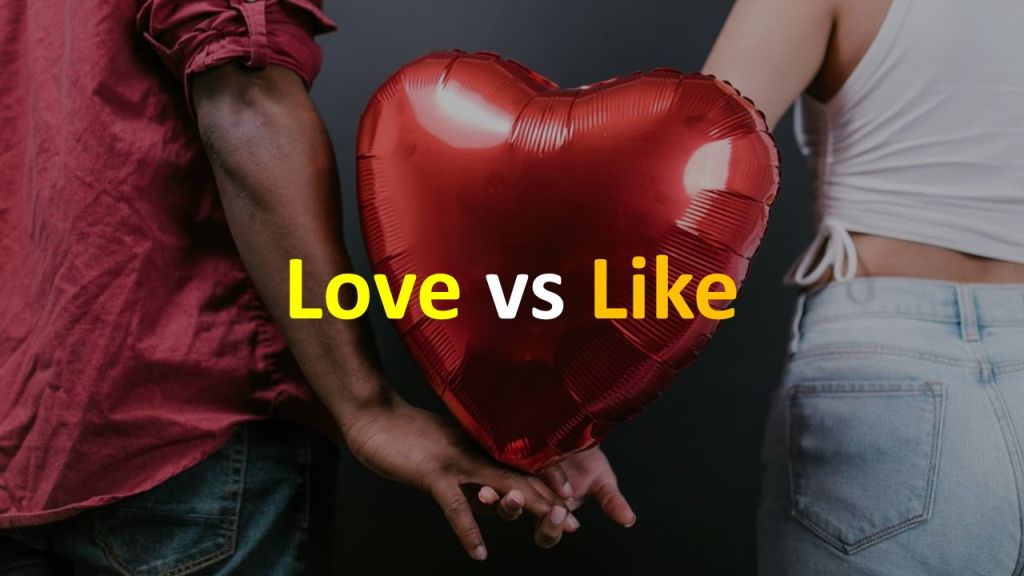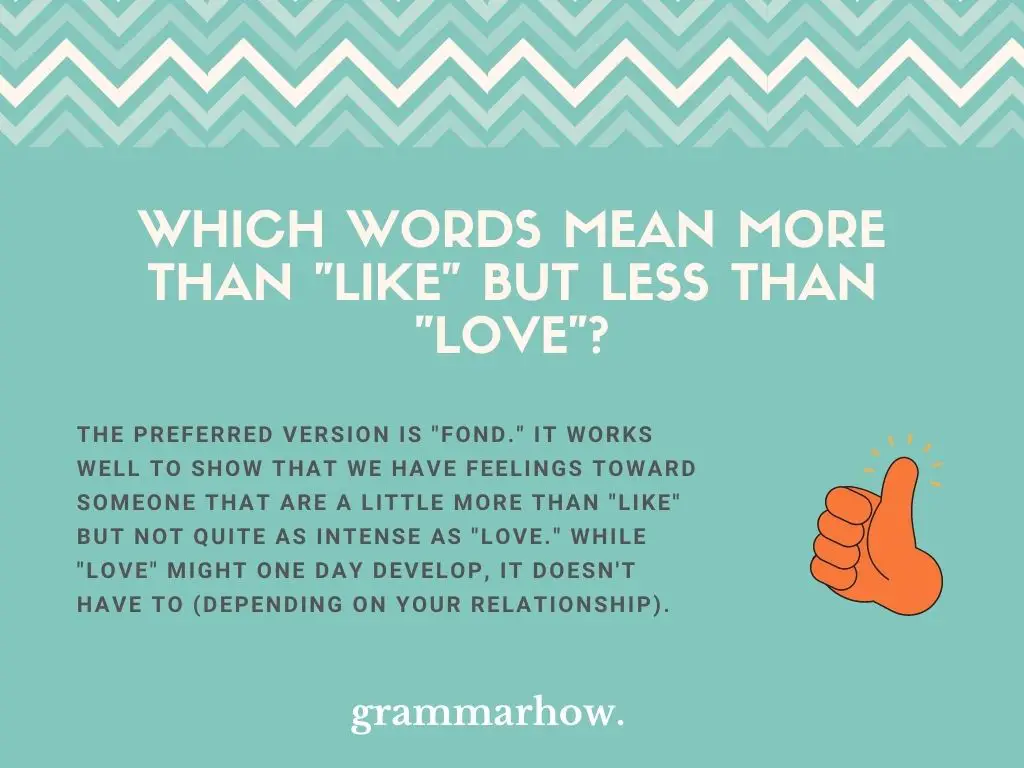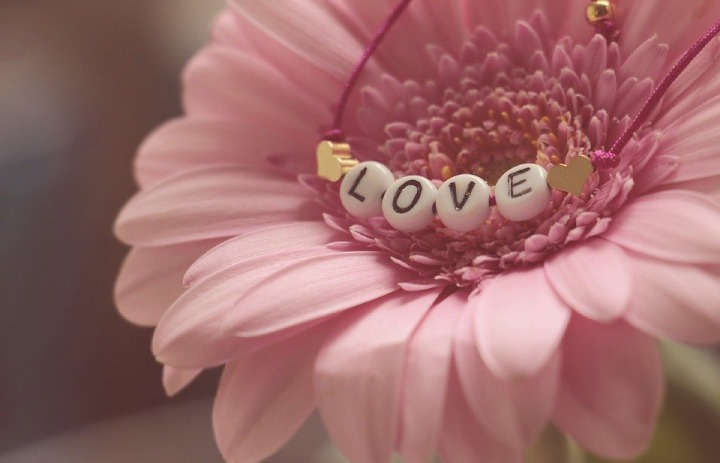Главная — Справочник — Разница между Love и Like
В чем сложность?
Словами love и like мы выражаем любовь или симпатию. Но иногда одно слово может использоваться вместо другого.
Что делать?
Разница между словами, безусловно, есть. Давайте разбираться.
Love
Love [lʌv] — любовь, любить. Наивысшая форма симпатии, очень сильное безусловное чувство. Существительное и глагол.
Представьте маму с детьми. Вряд ли они скажут: “We like you, Mom,” вместо “We love you, Mom.” То есть отношение родителя к ребенку и ребенка к родителю — нечто безусловное, и эти эмоции максимально естественны.
Мы также love что-то, когда это что-то доставляет нам очень большое удовольствие. Помните слоган Макдональдс? I’m loving it! Маркетологи даже использовали present continuous c глаголом love минуя правила грамматики, чтобы максимально подчеркнуть то наслаждение, которое их еда может подарить нам здесь и сейчас.
Используйте предлог of — love of the sea — когда говорите о неодушевлённых предметах или явлениях;
Используйте предлог for— love for children— когда говорите об одушевлённых предметах.
Самые часто употребляемые фразы:
Fall in love — влюбиться;
To be in love — быть влюблённым в кого-то / что-то.
Like
Like [laɪk] — нравиться. Глагол. Есть и like — отметка «нравится» в соцсетях. В этом случае это существительное.
Чувство менее глубокое и серьезное. Like — больше про романтические, нежели детско-родительские отношения или отношения, которые строились много лет.
Фраза “I like you” часто используется, когда люди только начинают встречаться или как предложение отношений. Она легкая и ни к чему не обязывает.
Кроме того, мы like множество других вещей: готовить, учиться, кататься на велосипеде, а ещё кофе, путешествия, настольные игры… И только когда мы буквально готовы всю жизнь только этим и заниматься, мы можем употребить love.
I love traveling. — Я люблю путешествовать.
Закрепим?
Подставьте в пропуски love или like.
- Let us all be a happy family and ______ each other.
- Which do you ______ better, fish or chicken?
- I ______ Kate but I don’t like her sister much.
- He is a pilot and his ______ of the sky is immense!
- His ______ for his family inspired him every day.
- I literally ______ coffee from that coffee shop. It’s amazing!
- I don’t like what she did.
- Bill has fallen in ______. Just look at him!
- Do you ______ tea with lemon?
- He ______ jogging before breakfast.
- Let us all be a happy family and love each other.
- Which do you like better, fish or chicken?
- I like Kate but I don’t like her sister much.
- He is a pilot and his love of the sky is immense!
- His love for his family inspired him every day.
- I literally love coffee from that coffee shop. It’s amazing!
- I don’t like what she did.
- Bill has fallen in love. Just look at him!
- Do you like tea with lemon?
- He likes jogging before breakfast.
Узнайте также в Справочнике
Обновлено: 25 января 2022 года
Словами “love” и “like”можно выразить симпатию и рассказать о своих чувствах. Но в каких случаях какое слово будет уместнее? Чтобы никогда не путаться в лексике советуем посетить Вам курс английского для начинающих. А пока давайте разберемся в чем же принципиальная разница этих двух слов!
Love
Произношение:
/lʌv/
/лав/
Значение слова:
Любить
Употребление:
Это слово мы используем, когда имеем в виду наивысшую степень симпатии. То есть, нам настолько нравится что-то, что мы готовы провести всю жизнь с этим.
Примеры:
Я love свою жену!
Мой брат love плавать, он занимается этим с 3-х лет.
Хотите заговорить на английском?
Приходите на наш бесплатный онлайн мастер-класс «Как довести английский язык до автоматизма»
Подробнее
Также Вы можете ознакомиться со всеми онлайн-курсами английского языка.
Like
Произношение:
/laɪk/
/лайк/
Значение слова:
Любить, нравится
Употребление:
Говоря “like”, мы подразумеваем симпатию, но не серьезную. То есть, вам просто приятен кто-то или какое-то действие, вам доставляет это удовольствие, но вы спокойно проживете и без этого.
Например:
Я like есть сладости.
Мой брат like плавать по выходным.
В чём разница?
Love — любить.
Like — нравится.
Задание на закрепление
Переведите предложения на английский язык. Свои ответы оставляйте в комментариях.
-
Мне нравится наша новая сотрудница.
-
Иногда я люблю кататься на велосипеде.
-
Тебе нравится это платье?
-
Я люблю зелёный чай. Я пью его каждое утро.
-
Моей сестре нравится отдыхать в Европе.
-
Он любит эту девушку.
Key Difference – Like vs Love
Like and love are two of the most common emotions or feelings experienced by people around the world between which a key difference can be observed. One can like girls but truly love only one of them. Of course, this suggests a higher intensity or strength of feelings between people we like and the person we love but in reality there are differences between liking and loving that are hard to quantify. It means that it is not necessary to love a person whom you like while you obviously like the person you love too much. If all this sounds confusing, read on to know the differences between like and love.
What is Like?
One can like a lot of things and people in his life. For example, one can like dancing, skating, swimming, or as the company of a friend. In today’s scenario, like is displaying one’s attraction towards a variety of objects publicly on social networking websites. However, in real life and in particular while dealing with other people, we tend to enjoy time with those whom we like. You like a person on the basis of his qualities such as physical attributes or because of respect and compassion. When you are physically attracted towards a person, you obviously like him a lot. You are happy when you are in the company of a person you like.
What is Love?
Love is the gift of God, a special feeling or emotion that one feels for a person of the opposite sex. Here, we are talking about adult love and not the feeling of love between a mother and her kids or between grandparents and their grandchildren. Love is a strong and passionate emotion that a man and woman feel towards each other. It is a feeling that is beyond description in simple words. If you love someone, your heart beats fast in his presence, and you feel shy when he is around though you may have been waiting for him for hours or days. Love is all one needs in his life, and it is never too late to love in life are two phrases to signify the importance of love in one’s life. There are of course other sayings such as Love is God, and one is never too old to love that again emphasize the importance of loving and being loved by someone else.
Definitions of Love and Like:
Love: Love is a special feeling or emotion that one feels for a person of the opposite sex.
Like: Like is a preference.
Characteristics of Love and Like:
Object:
Love: An individual can truly love one person of the opposite sex.
Like: One can like many different people and objects.
Nature:
Love: Love is unconditional.
Like: Liking is dependent upon many factors.
Feelings:
Love: Love connotes much more intense and passionate feelings.
Like: Likeness connotes pleasant feelings.
Life:
Love: The person whom you love takes center stage in your life, and you cannot imagine life without him or her.
Like: Liking a person does not denote that he becomes the center stage in life.
Image Courtesy:
1. Happy Couple By Bùi Linh Ngân from Hanoi, Vietnam (Hanh Dung – Son) [CC BY 2.0], via Wikimedia Commons
2. Four girls friends 001 By Oneras [CC BY-SA 2.0], via Wikimedia Commons

When it comes to the emotions involved in relationships between men and women, there are a lot of grey areas, athough, some are usually clearly defined. One example of the latter, is the way that most people can differentiate the feelings that they have for someone they like, and someone they love.
Let’s take the relationship between a mother and her young son as an example. Naturally, your son would not say: ‘I like you, mom’ – instead it’s ‘I love you, mom’. In this instance, the difference between love and like is that the emotion between parent and child is something that is unconditional. A child is born loving his or her parents, so the emotion is deeply embedded, and comes naturally.
But if love is unconditional, how about liking someone? This has something more to do with romance, than paternal love. Most men and women who are in a fairly new relationship are usually hesitant to voice their feelings. So, instead of saying: ‘I love you’, right away, they say: ‘I like you’, instead.
In the complex world of love, dating and relationships, readily admitting that you love someone may scare the other person away ‘“ because it entails a long-term commitment. For men and women, admitting love is usually a signal that the relationship is growing to be more serious, and could eventually lead to marriage.
Let’s take a look at more of the key differences between loving and liking. Liking someone means that you are happy being with that person, while loving someone means that you absolutely cannot bear to be without that person. As cliche as it may seem, liking gives you the proverbial butterflies in the stomach ‘“ but loving someone involves something much deeper than that.
All in all, the difference between love and like has something to do with the depth of your emotion towards somebody. Liking may give you that warm, fluttery feeling inside ‘“ but it’s mostly superficial. Love, on the other hand, involves much deeper, complex emotions, making it one of the greatest feelings that you will ever have in your lifetime.
Summary:
1. Love is an unconditional emotion, while like is a more watered-down version of love.
2. Loving someone means that he or she means everything to you, while liking someone means that you are simply happy being with that person.
3. Love involves deeper, stronger emotions, while like is more of a tender feeling towards that special someone.
4. Love is another person becoming an integral part of your life, while like is being comfortable in the company of a person.
Here are some of your interesting questions about Like vs Love
Difference between I like you and I love you?
I like you- This is a common term used to refer to an appeal to a person. It can be used in reference to romantic and platonic relationships. ‘I like you just as a friend’
I love you- Often used in romantic relationships, this is a phrase used to show commitment to another person. It can also be used in family, work or friendship relations. ‘I love you and will always be by your side’
Can you Include some love and like difference quotes?
Love Quotes
A life lived in love will never be dull.”
“True love stories never have endings.”
Like Quotes
” I like you a lot”
“I really like everything about you”
- Author
- Recent Posts
Loading…
Email This Post
: If you like this article or our site. Please spread the word. Share it with your friends/family.
Cite
APA 7
, . (2021, March 18). Difference Between Love and Like. Difference Between Similar Terms and Objects. http://www.differencebetween.net/miscellaneous/difference-between-love-and-like/.
MLA 8
, . «Difference Between Love and Like.» Difference Between Similar Terms and Objects, 18 March, 2021, http://www.differencebetween.net/miscellaneous/difference-between-love-and-like/.
Table of Contents
- Why you shouldn’t use the word like?
- Why do I say like a lot?
- Why does everyone say kind of?
- What word can I use instead of as?
- What’s a stronger word than I love you?
- What emotion is higher than love?
- Is there a word in between like and love?
- Why do people say like every other word?
- Is but a filler word?
- What can I say instead of for example?
- Why do Californians say like a lot?
- Is using like bad?
- adore,
- delight (in),
- dig,
- enjoy,
- fancy,
- groove (on),
- love,
- relish,
What word can I use instead of like?
| enjoy | love |
|---|---|
| adore | appreciate |
| fancy | relish |
| savorUS | be fond of |
| embrace | admire |
How do I get rid of saying like?
- 1 Tap your leg every time you say “like.”
- 2 Record yourself speaking.
- 3 Listen to yourself as you talk.
- 4 Pause and take a breath.
- 5 Use approximations instead of “like.”
- 6 Try “said” instead of “like” before a quote.
- 7 Don’t modify adjectives and adverbs.
- 8 Expand your vocabulary.
What is a stronger word than like?
Fond can be considered as more than like and less than love. ( Used as be fond of) Having a strong liking, inclination, or affection: fond of ballet; fond of my nieces and nephews. http://www.thefreedictionary.com/fond. Though, it might depend on the context and it can be synonymous to like also.
Why you shouldn’t use the word like?
While there are many grammatically appropriate ways to use “like” in a sentence, many young people, and a few older ones as well, use the word as filler in sentences, cluttering up their speech and making them sound unsure and possible even uneducated. If you’re a habitual “like” user, you’re not alone.
Why do I say like a lot?
Basically, that means that they’re giving the conversation they’re having with you their full attention and are considering what they have to say very carefully, rather than tuning you out. They might even have a lot more to say than you, too.
Why does everyone say kind of?
Using “kind of/sort of” allows a speaker to moderate their statements and build in some vagueness and wiggle room. It’s a way to hedge one’s bets should someone take offense or question what’s been said.
| since | because |
|---|---|
| seeing | whereas |
| forasmuch | being |
| cause | considering that |
| inasmuch as | seeing as |
What’s a stronger word than I love you?
Cherish – I cherish my time with you. This is stronger than the word ‘love’ in that it shows just how much you value spending time with them.
What emotion is higher than love?
Is there anything greater than love? In a simple answer, yes there is. Gratitude. To have gratitude for someone means to have no judgment of them, or you.
Is there a word in between like and love?
There’s an Awesome Stage Between “Like” and “Love,” and This Is What It’s Called. … “Well,” I said, “I think I am in pre-love.” It’s a stage of a relationship we don’t have accurate language for, because it’s often brief. You’re hovering on the edge, trying to pin down how you really feel and guessing what might happen.
Why do people say like every other word?
Why Americans throw ‘like’ in the middle of sentences. … It’s so versatile and can be used in almost any sentence. The word was first popularized by the Beatniks in the 1950s as a sign of being cool. The word only reached mainstream popularity in the 1980s after the song “Valley Girl” became widely recognized.
Is but a filler word?
But. “But” is a conjunction that joins phrases within a single sentence together. The word can be used to start a sentence – a use usually reserved for informal writing – but it isn’t needed. The advice also applies to other conjunctions such as “and” and “yet” as well as words like “however.”
What can I say instead of for example?
- “For instance …” “For example” and “for instance” can be used interchangeably. …
- “To give you an idea …” Use this phrase to introduce a use case or example. …
- “As proof …” …
- “Suppose that …” …
- “To illustrate …” …
- “Imagine …” …
- “Pretend that …” …
- “To show you what I mean …”
Why do Californians say like a lot?
Perhaps one of the most distinctive and divisive words on this list, the use of the word “hella” is an immediate indication that the speaker is from northern California. Derived from “hell of a” or “hell of a lot,” the word is generally used in place of “really,” “a lot,” or “very.”
Is using like bad?
“Like” isn’t altogether useless. It can be used for anything from pausing without dead air to purposefully lightening a statement. “Like 500 attendees,” for example, feels like a softer expectation than “500 attendees.” Thankfully, there are plenty of filler words you can use without the stigma.
“Love” is a strong word. “Like” isn’t a strong enough word. There’s a happy bit in between that we often want to use for some people, but we might not know what the words are. This article will help you to come up with some good alternatives for this problem.
There are a few great words we can use that are in the middle of “like” and “love.” Why not try out some of the following:
- Fond
- Admire
- Adore
- Infatuated
- Fancy
- Charmed
- Care for
- Respect
- Appreciate
- Think the world of
- Have a soft spot for
The preferred version is “fond.” It works well to show that we have feelings toward someone that are a little more than “like” but not quite as intense as “love.” While “love” might one day develop, it doesn’t have to (depending on your relationship).
Fond
“Fond” is a simple word that bridges the gap between “like” and “love.” We can use it to refer to our friends that we’re really close to, even if there is never a chance for “love” to be an option between us.
The definition of “fond,” according to The Cambridge Dictionary, is “to like someone or something very much; to like doing something.”
These examples will help you with this one:
- I’m so fond of you. I wish you could stay with me here forever.
- I truly am fond of you all. I don’t know what I’d do without you.
- She is apparently very fond of you, which is why I think it’s time you have a little conversation with her!
Admire
“Admire” works well to show that you have a lot of respect for somebody. It can work when we are impressed with their choices or actions around us. The better their behavior, the more likely we will “admire” them.
The definition of “admire,” according to The Cambridge Dictionary, is “to respect and approve of someone or their behavior.”
These examples will help you make more sense of this one:
- I admire you so much, and I wish I could be more like you.
- I admire my teacher, and I always tell her just how much I appreciate her methods.
- You really do admire him, don’t you? Why don’t you talk to him more?
Adore
“Adore” is a great word that is somewhere between “like” and “love.” It works well when describing how we feel about our friends because we “adore” them in our lives. Usually, that means they’ve had a large impact on us.
The definition of “adore,” according to The Cambridge Dictionary, is “to love someone very much, especially in a way that shows a lot of admiration or respect, or to like something very much.”
Check out these examples if you want to see more:
- I adore you more than you know, and that’s why I think we’ll always be friends.
- I truly do adore you all, and I’m so grateful that I get to call you all my best pals.
- She adores me. She said so herself! If only I could find a way to turn that to love.
Infatuated
“Infatuated” works to talk about a strong feeling that’s close to “love,” but not quite there. Usually, infatuation doesn’t last, which is why it’s not the best choice on this list. However, if we are swept away briefly by our feelings, this word could work well.
The definition of “infatuated,” according to The Cambridge Dictionary, is “having a very strong but not usually lasting feeling of love or attraction for someone or something.”
Check out these examples to see it work:
- I’m infatuated by him, but I don’t think I’d ever be able to tell him that.
- Well, I’m certainly infatuated with you and the way you talk to me.
- I’m infatuated with all of the things he does for me, but I don’t have the stomach to tell him how I feel!
Fancy
“Fancy” is a common word we use when we want to show that we like someone more than a simple feeling, but we don’t “love” them. Usually, it means we want to get to know that person more to decide whether “love” might one day be on the table.
The definition of “fancy,” according to The Cambridge Dictionary, is “to start liking something or someone very much.”
These examples will help you make it work:
- She told me that she fancies me, and I really don’t know how to take that!
- I fancy you so much, and I think it’s about time that we gave each other a chance.
- I can see why everyone fancies you, and I certainly agree with the masses!
Charmed
“Charmed” works well to show that we are pleased by someone’s actions. Often, it’s based on a certain “charming” quality that someone possesses. This quality isn’t usually enough for us to fall in “love,” but it’s definitely more than “like.”
The definition of “charmed,” according to The Cambridge Dictionary, is “very pleased or attracted by someone’s charm.”
Here are some examples:
- If I had to be honest, then I’m absolutely charmed by you.
- I’m always so charmed by you, and I don’t know why you have such a profound effect on me.
- I am so charmed by you. Thank you for being part of my life.
Care For
“Care for” works well when we want to show that we “care” about someone. It isn’t quite “love,” but it is much more than “like.” It works particularly well when referring to close friends or family members for this reason.
Here are a few ways we can get this one to make sense:
- I really care for her, but I don’t think he cares much for me back. I need to apologize for what I did.
- I truly care for you, and I’m sorry if I ever hurt your feelings. I’ll make sure never to let it happen again.
- I care for you more than you probably realize. Without you in my life, I’d be totally lost!
Respect
“Respect” is another great way to show that you admire someone. Often, people earn our respect based on the actions they take and how they’ve impacted our lives. It’s a great way to show how much you like someone.
The definition of “respect,” according to The Cambridge Dictionary, is “admiration felt or shown for someone or something that you believe has good ideas or qualities.”
These examples will help you make more sense of it:
- I really respect each and every one of you. I want you to know that I’ll always be here when you need me to.
- I respect you so much, and I can’t understand why you can’t find yourself a nice girl to make you happy!
- I really do respect you. You’ve done so much for me, and it’s about time I repay the favor!
Appreciate
“Appreciate” works well as another word that implies we like someone a lot without loving them. It means that we recognize how important they are in our lives and that they’ve played an integral role in getting us to the places we are today.
The definition of “appreciate,” according to The Cambridge Dictionary, is “to recognize how good someone or something is and to value him, her, or it.”
Check out these examples to see how it works:
- I must admit, I really do appreciate you. Without you around, I don’t know what might have happened to me.
- I appreciate you and all the things you do for me. You’re a saint, and I couldn’t live without you.
- I just want to say that I really appreciate you all as my closest group of friends!
Think The World Of
“Think the world of” works when you want to show that you think about someone a lot more than is typical if you simply “liked” them. However, it isn’t as strong as using “love,” and it can apply to some of your closest friends.
Often, this phrase works well when someone does a lot of kind things for you. If they’ve proved their friendships by the actions they’ve chosen to do for you, then you might “think the world of” them.
Here are some examples to help you with it:
- I truly do think the world of you. Honestly, without you, I don’t even know where I’d be in my life right now.
- I think the world of him! Without him, I’m sure that I would have gone insane, and that wouldn’t help anybody.
- I think the world of you. I’m so thankful that you’re in my life, and I hope you never leave me!
Have A Soft Spot For
“Have a soft spot for” shows that we like someone a great deal. A “soft spot” means that we feel weak or are able to let our guard down toward someone (always in a positive light). It works well to show how much they mean to you.
There are plenty of ways we can use this phrase, as you’ll see from the following:
- I truly have a soft spot for you, and I think I’m so blessed to have you in my life.
- I have a soft spot for her, that’s for sure. I don’t think I’d ever be able to tell her that, though, without panicking first!
- You have a soft spot for him, and it’s really obvious to everyone else. Maybe you should just tell him!
Martin holds a Master’s degree in Finance and International Business. He has six years of experience in professional communication with clients, executives, and colleagues. Furthermore, he has teaching experience from Aarhus University. Martin has been featured as an expert in communication and teaching on Forbes and Shopify. Read more about Martin here.
Differences Between Love And Like: The two terms love and like are sometimes used interchangeably, yet one could feel the guilt of the differences in its connotation when used. In other words, despite being used interchangeably, they do not conduce to the same implication. Both are characterized by feelings. Both are expressive; capable of conveying thought and feelings. Love is a strong affection and sincere caring affection towards another. It is a deep and abiding liking or enthusiasm for someone or something.
On the other hand, likeness is the feeling of pleasure by or with someone or something. Simply put; to like is to be pleased by, to be in favour of, or to show support and approval of something. Liking something means that you find that thing attractive. Both love and likeness conveys an acceptance. Asides some interflowing similarities, here are the differences between love and like.
Recommended: Meaning and Differences Between Love and Lust
Differences Between Loving And Liking
1. Love is more complex than like: while love is complex, likeness is simple and definite. Likeness is a certain feeling of attraction. The feeling of likeness is always crystal clear. You can easily point out something which you like and to what extent you like it. Likeness is a settled feeling, unlike love. Love may take time to be ascertained; especially if it is a romantic love. Even filial love may become obscure to a child.
A child who admires the flames of fire would out of immaturity; desire to have a taste of the fire by placing his hands on it. The mother who understands the danger and pain which fire inheres may put the child away from the fire in a harsh manner. For the mother, this is love and responsibility, but for the child, he may think that the mother does not want him to have fun. Love can be complicated.
Sometimes, it may not make sense. Sometimes it is not well understood. Love is accompanied by series of events. When you love someone, you do almost anything, but when you like something, it is just a mere physical attraction and as such, it is not worth going certain extent for.
2. Love is unconditional whereas Liking is conditional: while love is always unconditional, likeness may be hinged upon some existing conditions. You don’t just like someone or something for no singular reason. When the feeling is that of likeness, then there is a reason or a thing particularly admired. You could like someone for the person’s physical attributes, abstract characteristics and for whatever reason. You could name the reasons surrounding your attraction to the person or thing.
On the other hand, even without any physical or abstract attraction, love will always be. However, it is correct that likeness can help strengthen love the more. Think about mischievous and notorious children, yet it does not alter their parents’ love for them. Love will always be without conditions, although it is possible for its intensity to drop down.
Also see: How to handle a cheating husband
3. Love connotes Long-term commitment: when someone professes love for another, it suggests that a long term commitment is intended. It means that the feeling has gone beyond those mere physical attractions. When there is love, the love has been and will always be.
This does not mean that love cannot turn into hatred or even stop existing ordinarily. It simply implies that love always has a tendency to last longer than likeness which is embedded in mere existing attributes. For likeness, when the attributes giving rise to its existence stops to exist, the likeness ceases as well.
4. Likeness is embedded in physical Attraction whereas love is not: likeness is the totality of the feelings which one can see, or abstract attributes which one can feel. On the other hand, love is clearly deeper. The love word weighs greater than that of likeness, just like it weighs more in the practical sense. Because using the word “love” weighs greater, people may prefer to use “like” as a mere usher into matters of love, and as a test of possible reaction that will come from the person to whom the love is professed.
Thus, if I am uncertain about someone’s possible reaction if I am jump into professing my love to her instantly, I could simply start by professing my likeness instead. Moreso, likeness could lead to love and as well sustain an already existing love. This is in the sense that those physical and abstract attractions can actually lead to love.
Also see: How to become a better version of yourself
5. Likeness inheres in love but not always otherwise: this means that whenever there is love, likeness is there already. Likeness is all about having interest in something or someone. Certainly, you cannot love what you do not like. In other words, one cannot be said to love that which he does not have interest in.
On the other hand, likeness is capable of existing in isolation. In other words, likeness can exist in the absence of love. Likeness inheres in love; there cannot be love without likeness, but there can be likeness without love.
6. Likeness is concerned with pleasure but love is more than that: Likeness is the feeling of pleasure towards someone or something. While likeness is totally concerned about pleasure, love is all about responsibility and sacrifice.
Better put; love comes with a mixture of pain and pleasure whereas likeness is clearly all about pleasure and satisfaction. When you like something, you admire it, you want to acquire it, and you want to use it. Love is however not possessive.
Recommended: Advantages and Disadvantages of being self employed
7. Love is all about what you feel: love is all about what you feel whereas likeness is all about what you see and what you feel about them. The clarity here is that love is not totally guided by physical and abstract attributes.
It is rather a natural feeling of acceptance and responsibility, thereby having some elements of permanence. On the other hand, likeness is guided by the physical and abstract attributes which a person admires unto the other or a thing. When one therefore is pleased by those physical and abstract attributes, it interprets itself to a feeling of likeness.
8. Love is Gradual whereas likeness is Momentary: love could emanate from an accumulation of likeness. The complexities of love may render it difficult to ascertain. This is mostly the case when the love is a romantic one. Love does not occur abruptly.
It develops, gets ascertained, gets nurtured, and is required to be sustained. On the other hand, likeness can be short-lived. It could just last only as long as the attraction continues to be pleasing. Moreso, it does not take long to be indicated. You could indicate what you like at the very first sight of it.
Recommended: How to know you have fallen in Love
9. Love endures distance and time but likeness does not: while love can endure distance and time, likeness does not. This also illustrates the long-term attribute of love. Distance is never a barrier when it comes to love.
Love is not bound by time. Better put; love is timeless. The reverse is so when likeness is considered. Since likeness is not intensified, it is not sustainable. It can be interrupted by time and distance.
10. Love is intensified and passionate: while love can be intensified and passionate, likeness is looser and lighter. Love can be intensified and passionate in the sense that it is a strong and excessive degree of likeness to the extent that it does not entirely concern itself with physical and abstract attraction and other surrounding circumstances.
Love is persistent, enthusiastic, burning, sustainable and irresistible. Likeness may possess similar attributes but not as intensified as that of love. Likeness can easily be let go of but love is more sustainable as a result of its passionate attribute.
Recommended: How to keep a conversation going with a Girl
Conclusion
The known characteristics of love do not entirely apply to likeness. Likeness can neither be patient nor genuinely kind. The kindness emanating from likeness is only subject to the continued pleasing attribute of the object so liked. Same applies to other attributes.
This and other distinguishing factors discussed in this article define the thin clear lines between love and like. Yet, the two terms can still be used interchangeably for the purposes of comfort and formality.
Edeh Samuel Chukwuemeka ACMC, is a Law Student and a Certified Mediator/Conciliator in Nigeria. He is also a Developer with knowledge in HTML, CSS, JS, PHP and React Native. Samuel is bent on changing the legal profession by building Web and Mobile Apps that will make legal research a lot easier.
Like vs. Love
Like, can be used to indicate admiration and preference for someone or something whereas love is an intense and strong feeling towards someone.
Like vs. Love
Liking a person means that you are happy to be with him on the flip side; loving a person means that you cannot live without
Like vs. Love
Like is a mild feeling conversely love is a stronger feeling.
Like vs. Love
Like depend on factors like physical appearance, qualities, etc., on the other hand; love is unconditional.
Like vs. Love
Like is associated with pleasant feelings while love is associated with more intense feelings.
Lovenoun
(uncountable) Strong affection.
Likeverb
To enjoy, be pleased by; favor; be in favor of.
I like hamburgersI like skiing in winterI like the Seattle Mariners this season
Lovenoun
A profound and caring affection towards someone.
A mother’s love is not easily shaken.My husband’s love is the most important thing in my life.
Likeverb
(obsolete) To derive pleasure of, by or with someone or something.
Lovenoun
Affectionate, benevolent concern or care for other people or beings, and for their well-being.
Likeverb
To prefer and maintain (an action) as a regular habit or activity.
I like to go to the dentist every six monthsShe likes to keep herself physically fitwe like to keep one around the office just in case
Lovenoun
A feeling of intense attraction towards someone.
I have never been in love as much as I have with you.
Likeverb
(obsolete) To have an appearance or expression; to look; to seem to be (in a specified condition).
Lovenoun
A deep or abiding liking for something; an enthusiasm for something.
My love of cricket knows no bounds.
Likeverb
(archaic) To come near; to avoid with difficulty; to escape narrowly.
He liked to have been too late.
Lovenoun
(countable) A person who is the object of romantic feelings; a darling, a sweetheart, a beloved.
Likeverb
To find attractive; to prefer the company of; to have mild romantic feelings for.
I really like Sandra but don’t know how to tell her.
Lovenoun
A term of friendly address, regardless of feelings.
Hello love, how can I help you?
Likeverb
(obsolete) To liken; to compare.
Lovenoun
A thing, activity, etc which is the object of one’s deep liking or enthusiasm.
Likeverb
To show support for, or approval of, something posted on the Internet by marking it with a vote.
I liked my friend’s last status on Facebook.I can’t stand Bloggs’ tomato ketchup, but I liked it on Facebook so I could enter a competition.
Lovenoun
(euphemistic) Sexual desire; attachment based on sexual attraction.
Likenoun
Something that a person likes (prefers).
Tell me your likes and dislikes.
Lovenoun
(euphemistic) Sexual activity.
Likenoun
(internet) An individual vote showing support for, or approval of, something posted on the Internet.
Lovenoun
An instance or episode of being in love; a love affair.
Likenoun
(sometimes as the likes of) Someone similar to a given person, or something similar to a given object; a comparative; a type; a sort.
There were bowls full of sweets, chocolates and the like.It was something the likes of which I had never seen before.
Lovenoun
Used as the closing, before the signature, of a letter, especially between good friends or family members, or by the young.
Likenoun
(golf) The stroke that equalizes the number of strokes played by the opposing player or side.
to play the like
Likeadjective
Similar.
My partner and I have like minds.
Lovenoun
(obsolete) A thin silk material.
Likeadjective
(obsolete) Likely; probable.
Lovenoun
A climbing plant, Clematis vitalba».
Likeadverb
(informal) For example, such as: to introduce an example or list of examples.
There are lots of birds, like ducks and gulls, in this park.
Lovenoun
(racquet sports) Zero, no score.
So that’s fifteen-love to Kournikova.
Loveverb
To have a strong affection for (someone or something).
I love my spouse.I love you!
Likeadverb
In a like or similar manner.
Like the woman down the street so confidently sang, she wanted to be able to too.
Loveverb
(transitive) To need, thrive on.
Mold loves moist, dark places.
Likeconjunction
(colloquial) As, the way.
Loveverb
To be strongly inclined towards something; an emphatic form of like.
I love walking barefoot on wet grass;I’d love to join the team;I love what you’ve done with your hair
Likeconjunction
As if; as though.
It looks like you’ve finished the project.It seemed like you didn’t care.
Loveverb
To care deeply about, to be dedicated to (someone or something).
Likepreposition
Similar to, reminiscent of.
These hamburgers taste like leather.
Loveverb
(transitive) To derive delight from a fact or situation.
I love the fact that the coffee shop now offers fat-free chai latte.
Likeinterjection
Used to place emphasis upon a statement.
divint ye knaa, like?
Loveverb
(transitive) To lust for.
Likeverb
prefer or wish to do something;
Do you care to try this dish?Would you like to come along to the movies?
Loveverb
To have sex with, (perhaps from make love.)
I wish I could love her all night long.
Likeverb
find enjoyable or agreeable;
I like joggingShe likes to read Russian novels
Loveverb
To praise; commend.
Likeverb
be fond of;
I like my nephews
Loveverb
To praise as of value; prize; set a price on.
Likeverb
feel about or towards; consider, evaluate, or regard;
How did you like the President’s speech last night?
Lovenoun
a strong positive emotion of regard and affection;
his love for his workchildren need a lot of love
Likeverb
want to have;
I’d like a beer now!
Lovenoun
any object of warm affection or devotion;
the theater was her first lovehe has a passion for cock fighting
Likeadjective
resembling or similar; having the same or some of the same characteristics; often used in combination;
suits of like designa limited circle of like mindsmembers of the cat family have like dispositionsas like as two peas in a poddoglike devotiona dreamlike quality
Lovenoun
a beloved person; used as terms of endearment
Likeadjective
equal in amount or value;
like amountsequivalent amountsthe same amountgave one six blows and the other a like numberan equal numberthe same number
Lovenoun
a deep feeling of sexual desire and attraction;
their love left them indifferent to their surroundingsshe was his first love
Likeadjective
having the same or similar characteristics;
all politicians are alikethey looked utterly alikefriends are generaly alike in background and taste
Lovenoun
a score of zero in tennis or squash;
it was 40 love
Likeadjective
conforming in every respect;
boxes with corresponding dimensionsthe like period of the preceding year
Lovenoun
sexual activities (often including sexual intercourse) between two people;
his lovemaking disgusted herhe hadn’t had any love in monthshe has a very complicated love life
Loveverb
have a great affection or liking for;
I love French foodShe loves her boss and works hard for him
Loveverb
get pleasure from;
I love cooking
Loveverb
be enamored or in love with;
She loves her husband deeply
Loveverb
have sexual intercourse with;
This student sleeps with everyone in her dormAdam knew EveWere you ever intimate with this man?
Like and love is the two most common emotions or feelings experienced by people around the world. ‘To like’ means that you find something agreeable or satisfactory. Love is a strong feeling of affection. You like the person you love, but that does not mean that you love the people you like. Liking someone means to agree with them or being pleased with them. Loving someone means to have a deep feeling of affection for them. You certainly like someone whom you love, but it is not necessarily true that you love someone whom you like. Like is the feeling of being happy with the presence of a specific person. Love is the extremely intense feeling in which you cannot bear to be without a specific person with whom you are in love. As cliche, liking gives you the proverbial butterflies in the stomach but loving someone involves something much deeper than that. Like is to be comfortable in the company of a person. Love is a specific person becoming an integral part of your life. Like and love has a difference in the level of affection one have for something or someone. When you like a person, you feel happy when he/she is around you. But when you love someone, you feel that you can never manage to live without them. Like is based on choice, and it is an instant feeling. Love is based on trust, and it may take time to develop. The feeling of liking someone can be developed for anyone or anything. But the feeling of love is only developed for the very few in your life. ‘Like’ means admiration and attachment. Love means acceptance and endurance.
Like is a feeling of admiration towards something or someone. You say that you like someone or something only when you find them satisfactory. You can like a lot of things and people in life. When you say that you like a person, this preference could be based on the qualities or physical appearance of that person. Liking someone is also synonymous with respecting someone, agreeing with someone, or even having a crush on someone. It depends on the context. In modern society, ‘like’ also means to display approval through social media networks. Generally, people enjoy early stages and initial feelings of liking someone. They even like to talk to them and spend time together. They like learning all the details about each other — the feeling of likeness associates not only with the persons but also with the things. You tend to like a dress, shoes, a specific restaurant, or anything that make you happy or satisfied. But this is a controllable feeling. One can manage to live without a person or thing one likes. And the likeness is not permanent. It is temporary in a way that the likeness towards something keeps on changing. i.e., If you like a specific person or some reason you can dislike it if something bad about him/her happens to you (unlike love). Hence, this feeling ‘like’ is a limited state of emotions that is under the control of a person.
Love is a strong feeling of affection. Generally, love exists in the strong and long relationships. It is an unconditional emotion. It exists between the parents and their children, a husband and a wife, a brother, and a sister, etc. Also, we use ‘love’ when we are talking about something we like a lot. For example, “I love swimming.” Or “I love chocolate cupcakes.” Love is much deeper and different emotion. It is a thing of beauty. It gives you relaxation and confusion at the same time. It is a strange feeling among all. Love is full of passion and is always similar to those emotions felt when you first met that person. Love is not about gaining the upper hand. It is selfless and undemanding. Furthermore, the feeling of love once developed, cannot be replaced or demolished. The main feature of love is that it eliminates imbalances and different degrees of feelings. You do not love a person for a reason because love needs no reason. You love wholeheartedly. If you are in love with someone, merely the thought of losing them or going far away from you will make you sad. Hence it is an intense emotion whose outcome in every sense is extreme. Sometimes, people after accidentally losing the person they love could not manage to live happily ever. They dedicate their whole life to loneliness. Means the whole world becomes nothing or them due to the absence of the person they love.
How do you know if you love someone? Is it true Love or mere attraction you feel?
What is the difference between “I love you” and “I like you”?
Many thought they had already found the Love of a lifetime only to end up with so many tears. Some say they do not believe in Love anymore because of painful relationship experiences. So, how do you recognize Love?
Take a look at these 21 differences between Love and like. Evaluate what you feel for someone with these:
Please help to our YouTube channel if you like our video. Let’s grow together!
Love vs. Like: 21 Differences between I Love You and I Like You
#1.
Like: Skin-deep.
If you have fallen for the person because of his/her tantalizing eyes, beach body, or alluring tan, then you call that attraction.
Love: It Goes beyond the physical appearance.
Love does not look at the physical characteristics of a person. Although many love stories started with physical attraction, what led them to love is knowing each other deeper.
#2.
Like: You are thrilled to be with the person.
You are excited to be with the person. You feel like you are the luckiest man/woman in the world because s/he is near you.
Love: You find genuine happiness when you are with him/her.
It is more than excitement. You experience unexplainable joy and peace brought by the person’s presence. It feels like you are home.
#3.
Like: You get self-conscious when the person is around.
Your behavior changes suddenly when s/he arrives. For example, you run to the restroom to check yourself in the mirror. You should be impressive.
Love: You want to be true to yourself when you are with the person.
You want the person to see who you are, hoping that s/he will accept you despite your flaws. On the other hand, you do not want to deceive him/her.
#4.
Like: It happens overnight.
You feel you have been swept off your feet the moment your eyes met. It could be Love at first sight or a few hours of knowing the person made you realize s/he is the one.
Love: It takes time.
Usually, you cannot keep track of when it started. You have been around each other for quite some time, maybe as friends or colleagues, and the more you hang out together, the more you get attached unsuspectedly.
#5.
Like: You pretend to be interested in what the person says.
You want to make the person feel that you care about his/her thoughts, but the truth is you barely hear what s/he says because you are preoccupied with how cute the person is. You are also busy thinking about how you can impress him/her.
Love: You sincerely want to listen to the person.
You listen to what the person has to say because you want to understand him/her better. Moreover, you hope you can help in case there is a problem. However, you do not take advantage of the situation to impress.
#6.
Like: It is emotion-based.
You linger around while that giddy, ecstatic feeling about the person lasts. Then, when your heart does not beat fast seeing him/her anymore, you say it is over.
Love: It is decision-based.
You decide to stay with the person, care for him/her, and accept his/her imperfections, whether there is still magic in the air or not.
#7.
Like: You are proud to be seen with the person.
You want to flaunt that this person is with you, especially if s/he is good-looking because you want other girls/guys to envy you.
Love: You are proud of the person.
You do not care about the person’s credentials, whether others consider him/her a good catch or not. Instead, you are proud to be with the person simply because you love him/her.
#8.
Like: You want to be the best, so s/he will notice you.
You dress up, put your best foot forward because you want to catch his/her eyes.
Love: You are inspired to be the best of yourself because s/he deserves the best.
You want to be the best in every area, not just physically, because you want to be worthy of him/her.
#9.
Like: You get turned off.
Once you see his/her awful or embarrassing side, you come back to earth from cloud 9 and realize you do not like him/her anymore.
Love: You accept every flaw of the person.
Even if you see how bad s/he can be, you decide to stay and continue to believe in the person’s goodness.
#10.
Like: The person is perfect in your eyes.
For you, everything about him/her is flawless.
Love: You are not blind to his/her imperfection.
As the saying goes, “Love is not blind. It does see but it does not mind.”
#11.
Like: You see the person in your dreams.
Since you think about the person all day, it is not surprising that you find him/her even in your dreams.
Love: You see the person in your future.
You can envision building a home with that person because you have decided that s/he is the one for you.
#12.
Like: You get head over heels with the person.
It is like a spell that stops you from resisting him/her. If s/he would ask you to, you would willingly leave everything behind. You cannot accept nasty comments about the person, and you do not listen to advice.
Love: You regard the person levelheaded.
You can make sound judgments when it involves the person or your relationship. You can weigh decisions using your brain, not just your heart.
#13.
Like: You tolerate his/her mistakes.
You do not want to disappoint him/her, so you tolerate everything s/he does, even those not good like vices. What matters to you is his/her approval, not yours.
Love: You rebuke him/her.
It does not matter if s/he gets mad at you. What is important is his/her well-being.
#14.
Like: It fades the more you get close.
As you get to know the person more, the mystery and thrill start to wear off, and so does your feeling.
Love: It grows the more you get close.
The more you get to know him/her, the more you realize that you want to be with him/her.
#15.
Like: You want the person to take care of you.
You pretend to be helpless in the hope that s/he would volunteer to help and care for you.
Love: You want to take care of the person.
It does not matter if s/he returns the favor as long as you get to make sure s/he is alright.
#16.
Like: You want to be the center of his/her attention.
You get mad whenever s/he finds someone else attractive or s/he spends more time with other people.
Love: S/he is the center of your attention.
Even when there are better and more attractive people around, your eyes and focus are still on him/her.
#17.
Like: It lasts as long as the person is around.
Whenever you do not see him/her, it is easy to turn your attention to someone else.
Love: It endures distance and time.
True Love endures long distances and you are willing to wait.
#18.
Like: Meeting his/her family is not a big deal.
Usually, meeting his/her family does not even occur to your mind.
Love: Meeting his/her family is essential to you.
You bravely want to face his/her family because you are hoping you will be one of them someday.
#19.
Like: You are possessive of the person.
You get jealous when someone else gets close to him/her. However, S/he should be solely yours, so back off.
Love: You understand that you do not own him/her.
You treat him/her as a free individual. His/her happiness matters more to you.
#20.
Like: You desire to make Love to the person.
Because it is more of a physical attraction, there is a strong urge to have sexual intimacy with the person.
Love: Spending quality time with the person is more than enough.
You can still say you love him/her and stay around even without sex involved in the relationship.
#21.
Like: It is easy to move on.
Once the relationship is over, it does not take a long time to get over it. So you do not feel too miserable as well.
Love: It takes a long time to forget him/her.
The person will always have a special place in your heart even after a long time.
So, is it Love or is it like? Feel free to share your thoughts in the comments below.
Online courses recommended for you:
- Relationship Coaching: Transform Problems into Growth & Love:
Develop true Love & greater intimacy & a relationship growth mindset, stop destructive conflicts, find meaning & purpose. - Love & Connection: The Science of Successful Relationships:
This course will show you how to examine the unknown path that you’ll travel with your spouse, and carefully evaluate the strengths and weaknesses of your relationship.
Books recommended for you
* As an Amazon Associate I earn from qualifying purchases.
Fun gift ideas for couples:
* As an Amazon Associate I earn from qualifying purchases.
ALSO READ:
Love vs. Lust: 12 Differences You Should Know
Joan is a freelance blogger who loves writing about personal development. She also loves learning and teaching languages. A Communication Arts graduate, she now pursues a masters degree in Language Teaching. She is into mobile photography, writing poems, and reading for leisure.

























